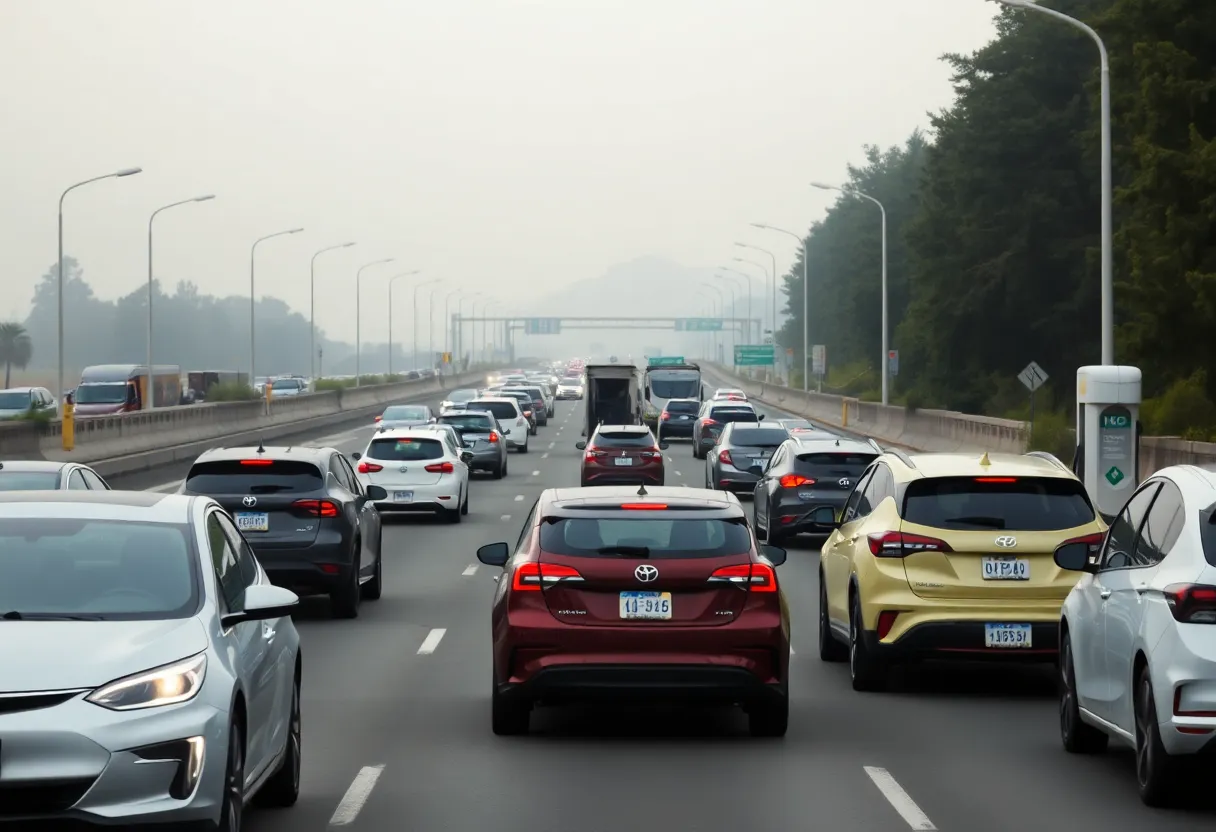News Summary
California’s vehicle emissions waivers, crucial for its environmental initiatives, were revoked by the U.S. Senate in a narrow vote. This decision disrupts the state’s goals for zero-emission vehicles and impacts other states that follow its stricter standards. Supporters of the repeal argue it protects jobs and economic stability, while environmental advocates warn of serious health risks. As California officials condemn the decision, potential legal challenges loom over this unprecedented revocation, raising questions about federal influence on state environmental policies.
California has faced a significant setback in its environmental initiatives as the U.S. Senate voted narrowly to revoke the state’s vehicle emissions waivers, with a tally of 51 in favor to 44 against. This legislation, part of a broader effort backed by Republicans, is expected to be signed into law by the President shortly and could drastically influence clean air regulations across the nation.
The decision not only affects California but also impacts nearly a dozen other states and the District of Columbia that had adopted California’s stricter emissions standards. For decades, California utilized waivers granted under the Clean Air Act, allowing the state to implement emission controls above federal requirements—a right established during the presidency of Richard Nixon.
California’s Air Resources Board had previously mandated that 35% of new vehicles sold by 2026 be zero-emission, leading to a goal of 100% zero-emission vehicles by 2035. However, the new legislation nullifies this authority, which has been in place for over 50 years, and undermines California’s capacity to spearhead efforts in reducing greenhouse gas emissions.
Supporters of the repeal, including the Specialty Equipment Market Association (SEMA), argue that California’s regulations posed threats to economic stability and consumer choice. They claim the repeal will safeguard over $100 billion in economic impact and protect around 330,000 jobs linked to internal combustion technology. It has also been pointed out that new taxes in the legislation include a $250 annual fee for electric vehicle owners, which is higher compared to approximately $82 in gas taxes for traditional vehicles.
Contrarily, environmental advocates have expressed alarm, suggesting that the repeal will hinder national efforts to achieve cleaner air and reduce pollution levels. Critics contend that the revocation presents serious health risks, potentially affecting approximately 150 million Americans due to worsening air quality. Additionally, the Coalition opposing the repeal has raised concerns that this decision could impede California’s ambitious plans for transitioning to electric vehicles and achieving vital infrastructure improvements necessary for supporting such a shift.
The ruling to revoke California’s standards also calls into question the legality of the congressional intervention. Nonpartisan experts, including the Senate parliamentarian, have suggested that invoking the Congressional Review Act to bypass established state rights may not hold up under scrutiny. As a result, there is mounting speculation regarding potential legal challenges from California’s government against the federal legislation if enacted.
California officials, including the state’s Governor and the Chair of the Air Resources Board, have condemned the Senate’s decision as a significant blow to public health and clean air protections. They assert the state has never had its emissions standards revoked before, emphasizing this ruling’s unprecedented nature.
This policy reversal marks a notable shift in how vehicle emissions might be regulated federally and raises questions about future precedents concerning congressional influence over state environmental policies. As discussions surrounding climate change and public health evolve, the implications of this decision are anticipated to resonate beyond California’s borders, affecting air quality initiatives nationwide.
The ongoing transition envisioned in California’s environmental plans requires extensive infrastructure advancements that may now be jeopardized by the legislative outcome. In the face of these developments, it remains to be seen how both state and federal entities will navigate the complex landscape of vehicle emissions and environmental responsibility moving forward.
Deeper Dive: News & Info About This Topic
- CBS News
- Wikipedia: California Air Resources Board
- Associated Press
- Google Search: California vehicle emissions standards
- The Guardian
- Encyclopedia Britannica: Clean Air Act
- Politico
- Google News: California emissions standards repeal
- Car and Driver
- Sacramento Bee

Author: STAFF HERE BEVERLY HILLS WRITER
The Beverly Hills Staff Writer represents the experienced team at HEREBeverlyHills.com, your go-to source for actionable local news and information in Beverly Hills, Los Angeles County, and beyond. Specializing in "news you can use," we cover essential topics like product reviews for personal and business needs, local business directories, politics, real estate trends, neighborhood insights, and state news affecting the area—with deep expertise drawn from years of dedicated reporting and strong community input, including local press releases and business updates. We deliver top reporting on high-value events such as the Rodeo Drive Concours d'Elegance, the Beverly Hills artSHOW, Concerts on Canon, and holiday celebrations throughout the city. Our coverage extends to key organizations like the Beverly Hills Chamber of Commerce and Visit Beverly Hills, plus leading businesses in luxury fashion, hospitality, and entertainment that drive the local economy. As part of the broader HERE network, including HERELosAngeles.com, HERESantaAna.com, HEREHuntingtonBeach.com, and HERECostaMesa.com, we provide comprehensive, credible insights into Southern California's dynamic landscape.



